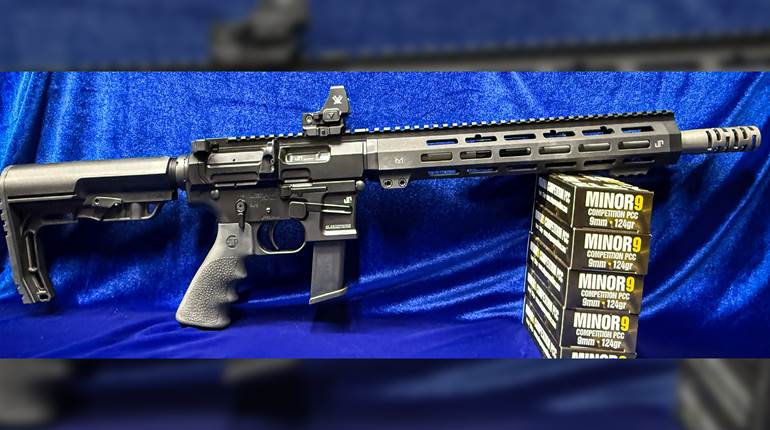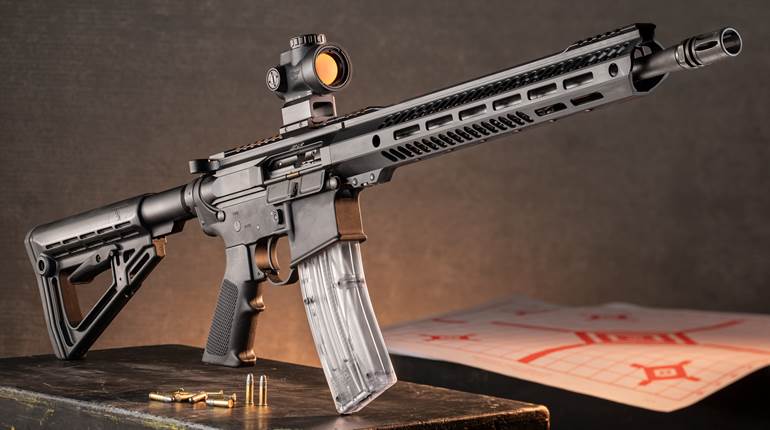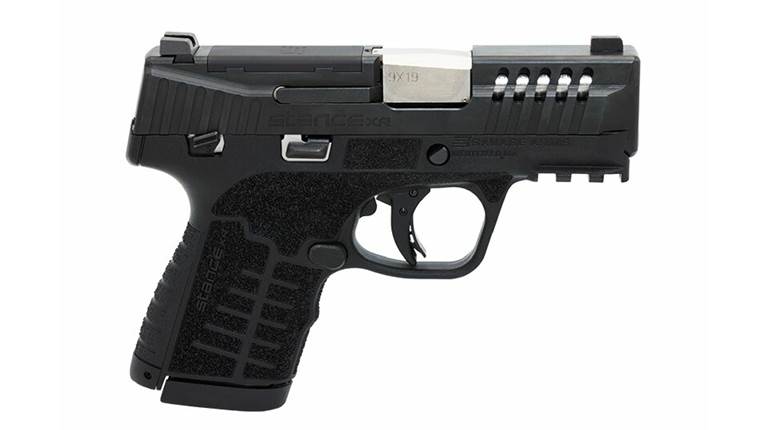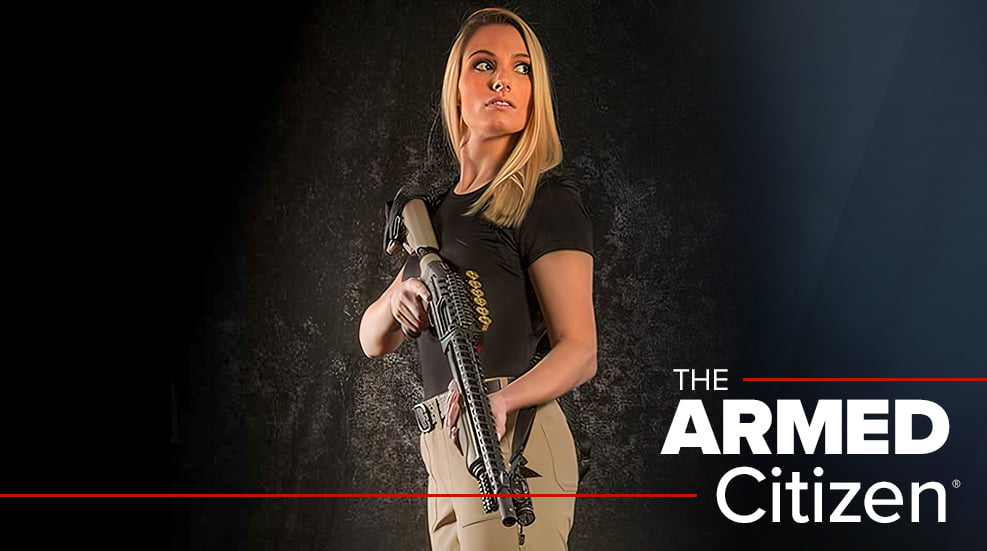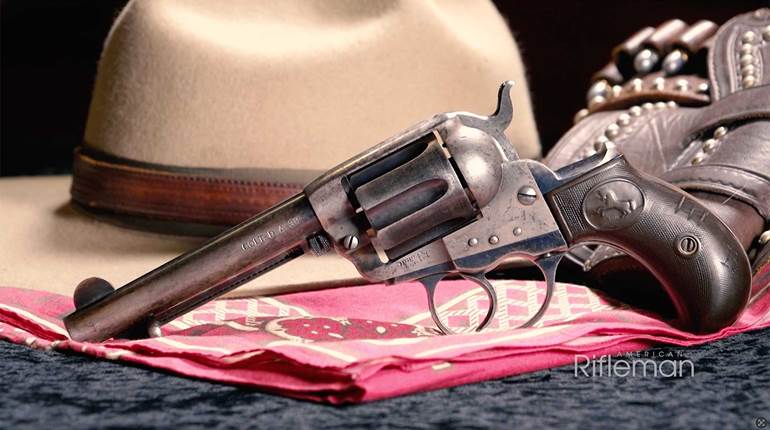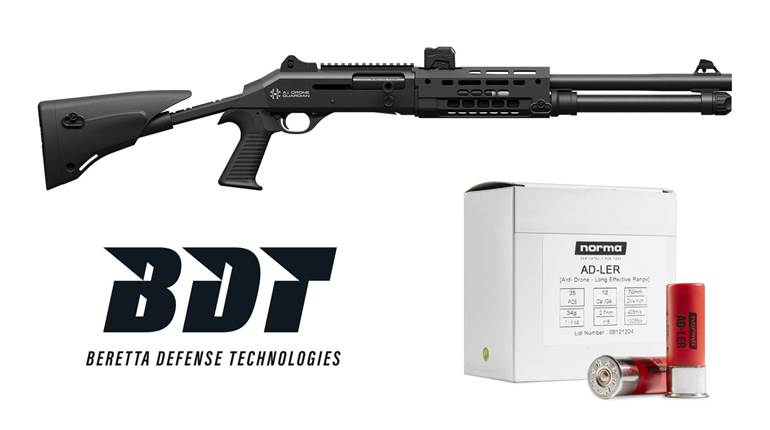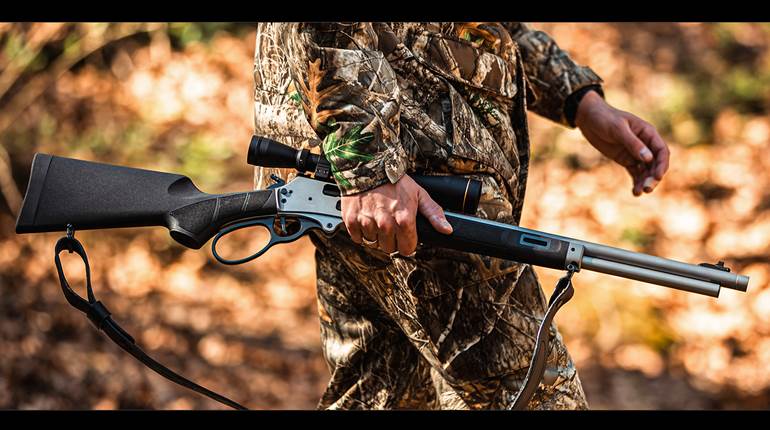
At the end of 2015, Bond Arms of Granbury, Texas, acquired a small semi-automatic pistol company called Boberg Arms, which produced compact, concealed-carry guns that employ unusual backward-feeding magazines. Although the Boberg design is certainly innovative, the pistols suffered from a reputation for sketchy reliability and an eye-popping price tag.
Gordon Bond, President and CEO, was determined to apply the same perfectionistic manufacturing standards to this little 9 mm as those used for the company's big bore double-barrel pistols. With the name changed from the XR9-S to Bullpup9, the semi-automatic wasn't going to leave the factory until the overall quality was improved, all the kinks were hammered out and the price reduced. That's why it's taken a year and a half for the Bond Bullpup9 to finally arrive on the market.

The Bullpup9 is a rotating barrel, locked-breech semi-automatic designed specifically to provide a longer barrel while maintaining more compact exterior slide dimensions. This is accomplished by placing the magazine well directly below the barrel's chamber (instead of behind it) and moving the trigger forward of the chamber. It's the forward trigger placement that qualifies the pistol as a bullpup firearm. 
In order to maintain tight tolerances and to ensure reliable operation, the metal components are precision-machined. You won't find any MIM or cast parts and the only piece of polymer is the magazine base plate. As the Bond Arms team was reworking the pistol, they found steel components that hadn't been hardened. Along with other subtle design improvements, those parts that need heat treating have received it.

The beveled satin-finish slide is machined from a billet of 416 stainless steel and features rear slide serrations and a set of dovetailed metallic, low-profile 3-dot sights which are drift adjustable for windage. The light weight frame is machined from a billet of aircraft-grade 7075 aluminum alloy treated with a matte-black hard-coat anodized finish to give the pistol a slick 2-tone finish. 
The external controls consist of a takedown lever and round magazine release button mounted on the left side, along with a smooth-faced double-action-only trigger set inside a generous, rounded guard. The pistol's two safeties are its long trigger pull and a firing pin lock that prevents the firing pin from moving until the trigger is depressed. The bullpup trigger actuates an exposed, flap-like hammer that can slap the web of the thumb a little if your grip is too high.


The trigger pull is unique because of its exceptional smoothness, and it cycles unlike anything else I've worked with. The trigger stroke is similar in length to that of a double-action revolver and it needs to be let back out all of the way to its starting point in order to reset. But it doesn't feel like a revolver. It's much lighter than a wheel gun at the listed pull weight of 7 lbs. 8 oz. and there's no stacking, resistance or grittiness at all. The pull is consistent all the way back to the frame. The trigger pull of the pistol I worked with was 7 lbs. 4 oz. according to a Lyman's digital trigger gauge. But based on how it feels, I would have guessed it was somewhere south of 5 lbs. It's one of the best double-action only triggers on a concealed-carry semi-automatic that I've worked with.

Bond Arms has thoughtfully applied what they've learned about manufacturing comfortable, good-looking hardwood grips for its potent double-barrel derringers to the new Bullpup9. The original polymer grips have been replaced with a handsome set of satin finished signature laminated rosewood grips with deeply engraved fish-scale texturing and a five point star. The grip panels are nicely contoured, neatly fitted to the frame and secured by a total of four hex-head screws. The grips back strap extends behind the magazine base plate to ensure it won’t nibble at the shooting hand during recoil.

The pistol arrived with two of the unusual rear-feeding 7-round magazines with stainless-steel bodies and no followers on top of the springs. To understand how the magazines work, you have to take a look inside the pistol.
Start by removing the magazine and verifying the pistol is completely unloaded. Pull the slide all the way to the rear and hold it in place while rotating the takedown lever from the 3 o’clock to the 9 o’clock position. Release the slide and press it forward off of the frame. A look inside the frame reveals the hammer mechanism, the pop-up feed ram and the integral aluminum rails that support the slide.

Inside the slide, on the left side are a thin recoil rod and a single recoil spring that looks like it belongs in a .22 rimfire rifle. Under the firing pin is a spring loaded pair of “tongs” that grasp the rim of the next cartridge in the magazine. The rotating barrel has three locking lugs, two of them lock into the slide with the third connecting to the sliding unlock block.

When the pistol is fired, the barrel, bolt face and slide remain firmly locked together until after the bullet has left the barrel. The barrel and slide then move backward in tandem for a short distance before the barrel rotates 23 degrees counter-clockwise to unlock from the slide. The slide then continues to move rearward on its own to eject the spent cartridge case with the tongs stripping a fresh round from the magazine. The weight of the unfired cartridge works to slow the rearward movement of the slide. A ramp plate pops up from the frame to align the cartridge with the chamber before the slide slams forward into battery.

To finish field-stripping the pistol, tip the recoil assembly out through the back of the slide. Press the barrel forward and then lift the unlock block out of the frame. Tip the barrel chamber up and press the barrel out of the slide. The pistol is now field stripped and ready to clean and lubricate.

There are a few defensive pistol features the Bullpup9 omits. There is no magazine disconnect or loaded chamber indicator. The trigger does not have a short reset. Like a revolver, it has to be released all the way back to its starting position for the next shot. The magazines do not drop free of the grip when the magazine release is pressed. Instead, they must be manually removed for reloading. Finally, the slide won't lock open when the last shot is fired. However, the slide can be locked open by swinging the takedown lever from the 3 o’clock to the 6 o’clock position while holding the slide back.

Resolving Reliability Issues
In order to make the Bullpup9 an utterly reliable concealed-carry pistol, Bond Arms had to tackle three primary concerns. The first was quality control (which has already been discussed). The second sticky issue was the contact points between the barrel and the unlock block.
The original Boberg pistols required the application of a thick, black anti-seize grease in between the barrel and unlock block. Without it the components would quickly over heat, expand and lock up the pistol. But the grease solution brought more problems to the table. Too much grease and it leaks out onto hands and clothes. Not enough and the pistol locks up. Just the right amount will keep the gun running for about 30 rounds before melting away. If the pistol experienced a bullet separation (more on that in a bit), the grease would hold the powder in the action requiring the gun to be cleaned before firing it again.

To eliminate the need for grease, Bond Arms researched various metal coatings including electroless nickel plating and Teflon. What they found worked best is the permanent RF85 coating process used by Anderson Manufacturing in their “no-lube” AR-15 platforms. To get the best results, the owner's manual recommends applying a light gun oil to the barrel and unlock block. Before going to the range, I treated all of the lubrication points on this pistol with Breakthrough Technologies' Battle Born synthetic high-purity oil which offers a broad temperature tolerance.


Bond Arms says if you shoot the pistol until it is excessively hot, dirty and essentially dry of lubricant, it will start to experience some stickiness in the action. I shot hundreds of rounds through the pistol without cleaning it or adding more lubrication and it ran flawlessly. The Bullpup9 is the very first handgun to use RF85 and based on results, I hope it's not the last.
The third hurdle for Bullpup9 reliability has to do with proper ammunition selection, which continues to be a work in progress. The problem has to do with ammunition manufacturing processes and the laws of physics. Most semi-automatic 9 mm firearms press cartridges forward from the magazine into the chamber by slamming the bolt assembly into the back of the cartridge case. If there is any slippage between the bullet and the cartridge case, the bullet moves a little deeper into case. The possibility of the bullet and cartridge case separating under these conditions is so low that some ammunition manufacturers produce practice-grade rounds with little to no crimp.
Because the Bullpup9 pulls cartridges backwards at high speed, instead of pushing them forward, the tightness of the crimp becomes a key factor. If the crimp is not tight enough, the cartridge case is literally yanked off of the resting bullet while dumping the powder into the action. A bullet separation can be handled with relative ease at the shooting range but it would be a serious problem in a defensive situation.
The solution is both simple and complicated. Shoot only ammunition that has at least 30 lbs. or more of crimp. Defense-grade hollow points may have 100 lbs. of crimp pressure making them a reliable option. But the only way to know for sure if a defense or practice grade load's crimp is tight enough is through the slow and expensive process of test firing hundreds of rounds.
As of this writing, Bond Arms has provided customers with a recommended ammunition list with nine defense-grade loads and 20 practice-grade loads from a dozen different manufacturers that have proved to run reliably in the Bullpup9. The company spent more time testing affordably priced practice rounds so that customers would know that even though this pistol costs more than some options on the market it will be affordable to feed for regular practice sessions.

I was able to lay hands on a total of nine different loads from the approved list in time for this review. They included three defense loads and six practice loads from Aguila Ammunition, Federal Premium, Hornady, Sig Sauer and Winchester. Some guns need a break in period of up to 200 rounds to settle down and run smoothly. The recommended break in for the Boberg XR9-S was a whopping 300 to 500 rounds before carrying the pistol for personal protection. With this pistol, all nine loads fired without a single malfunction or jam from start to finish using a total of four different magazines. That's impressive for any factory fresh pistol.
I did ask if the Bullpup9 is rated for +P ammunition since the pistol does not have a +P stamped on the frame or barrel. I was told that it is safe to fire +P loads in this gun because it can handle the added pressure safely like the original Boberg guns. However, it's recommended that owners limit +P ammunition in order to extend the pistol's working life span. With only one +P load on the approved ammunition list at this point, it seems likely folks will be sticking mostly to standard pressure loads until more high pressure options are added to the list.
At Home on the Range
Generally speaking, sub-compact and micro-9 pistols are tools much like wrenches and plungers. They’re stripped down and functional. You really want to have one when the need arises but they're not something that you enjoy owning or want to write home about. I like little pistols but I'll freely admit that many models aren't exactly fun to shoot. This pistol is an exception to the rule. 
The Bullpup9's fit and finish is top-notch from one end to the other. It looks and feels precision-built like a Swiss watch which means it's a gun you can take pride in owning. The grip fits comfortably in the hand and the trigger is butter smooth. The sights are nearly full size, making them easy to see. This pistol weighs in at just 18.6 ozs. unloaded but it feels lighter because there's no sense of muzzle heaviness. Racking the slide feels like chambering a rimfire pistol because there's so little resistance. The recoil is not punishing at all. It's moderate at most with more of a shove to the hand than a kick. Quick follow-up shots were easy to make using just one or both hands.

Usually when I'm on the empty-ammo-box end of a day at the range with a micro pistol, I'm tired and want to go home. Even though I spent more time testing this pistol than I do some models, it left me wanting more. I would gladly fire a box of ammunition through this pistol any time I'm on the range. I was interested to see how much velocity the 3.35" barrel was preserving so I took the time to check all of the test loads for 10 consecutive rounds using a Lab Radar chronograph. Here are the results with the manufacturer's listed velocities for comparison.

While some of the practice loads demonstrated velocity loses up to 176 fps., the defensive hollow points maintained close to list velocities with losses of just 16 fps. or less.
Because this is a sub compact pistol with a 2-finger grip, the formal bench rested accuracy testing using five 5-shot groups was conducted at 15 yards with two of the defensive hollow points and the company's recommended practice grade ammunition. Winchester USA 115-gr. full-metal jacket produced a best group of 1.53" with an average of 1.64". Sig Sauer Elite Performance 124-gr. V-Crown jacketed hollow points punched in a best group of 1.31" with an average of 1.39". The best performer of the day was the Hornady Critical Duty 135-gr. FlexLock with a best group of 1.25" and an average of 1.33".

Just to satisfy my curiosity, I set the target out to 25 yards and fired a few informal benched 5-shot groups. They hovered around 3.00", making this a micro 9 mm that can go toe-to-toe with mid-size and full-size pistols in the defensive accuracy department.
Parting Thoughts
Bond Arms has successfully transformed the Boberg XR9-S subcompact 9 mm from something of a pocket-sized oddity into a reliable, top-quality defensive pistol. Having tested one of the original Boberg pistols just before the company was purchased by Bond, it was easy to see the marked improvements the Bullpup9 has to offer. Eliminating the need for the anti-seize grease makes cleaning and lubricating the pistol much more convenient. This gun is exceptionally compact, good looking, accurate, fun to shoot and utterly reliable when loaded with company-approved ammunition.
Although the Boberg pistols were selling for as much as $1,300, Gordon Bond has kept the promise he made to his customers to trim the price down to a more reasonable suggested retail price of $977. As of this writing, the Bullpup9 is being produced in small lots of about 150 units per month sold directly to the public from Bond Arms. By the end of the year the company hopes to triple the production numbers with pistols available through select distributors. To learn more about the Bullpup9 and to view instructional videos, visit bondarms.com.

Specifications:
Manufacturer: Bond Arms
Model: Bullpup9
Action: Rotating Barrel Locked-Breech Semi-Auto
Trigger: Double-Action Only
Caliber: 9 mm
Slide: Machined Billet 416 Stainless Steel, Satin Finish
Frame: Machined Billet 7075 Aircraft-Grade Aluminum, Hard Coat Anodized Finish
Grips: Engraved Laminated Rosewood
Sights: Dovetailed Metallic 3-Dot
Barrel Length: 3.35”
Overall Length: 5.10”
Height: 4.20”
Width: 0.96”
Weight: 18.6 with Empty Magazine
Magazine: Rear-Feeding Single Stack, Stainless Steel
Capacity: 7 + 1
Twist: 1:10” RH
Rifle Grooves: 6
Safeties: Long Trigger Pull, Locked Firing Pin
Listed Trigger Pull: 7.5 lbs
Accessories: Two Magazines, Hard Case, Owner's Manual, Lock
MSRP: $977












